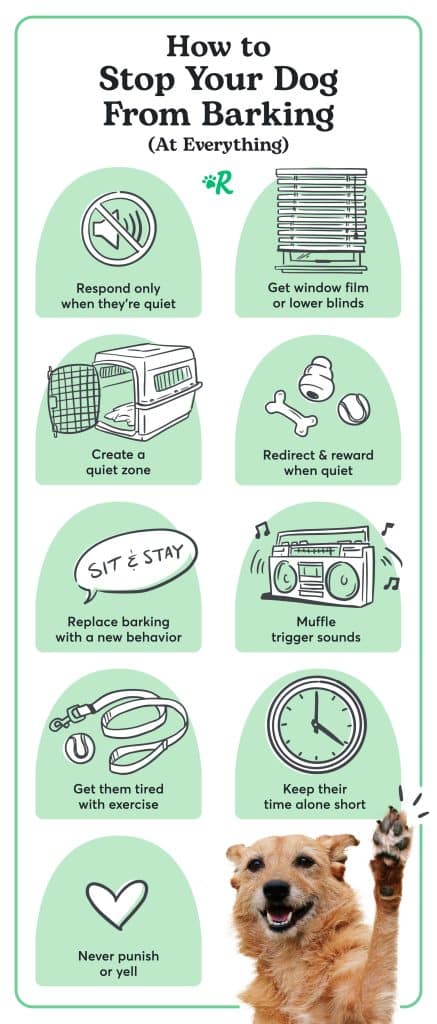- This post contains affiliate links. Read more here.
If your dog’s barking and whining is keeping you awake at night or, worse yet, waking you up hours before your alarm, you’re not alone. Nighttime disturbances are one of the most common wrinkles that need ironing out in your relationship with your dog.
More commonly, the cause behind your dog’s barking at night has a simple (and often accidental) origin. You, likely without realizing it, have taught your dog that barking and whining will bring them your attention. This is even more likely if your dog has a tendency to bark until you come running, during the day.
The solution, unfortunately, isn’t quite as effortless. Stopping your dog from barking at night is a multi-pronged approach that requires figuring out why your dog is barking, removing them from that trigger, and keeping up with training until the behavior phases out.
Causes of Barking at Night (And In General)
First things first, how did your dog pick up this frustrating, sleep-depriving habit? Dogs bark and whine for a variety of different reasons, most commonly:
- Bored or attention seeking
- To alert the family to a disturbance
- Out of fear or general anxiety
- Separation anxiety or loneliness
- Confinement distress
- In response to another dog or creature
- For attention, including displeasure from change of routine
- Because you accidentally reinforced them to
Of these, accidental reinforcement is what happens with most pups. If you’ve tried to quiet or soothe your dog when they bark, in hopes of getting them to sleep at night, you are teaching them that barking and whining brings you running. And once they learn that lesson, it’s a hard one to forget.
Tips to Stop Your Dog Barking at Night
1. Get a white noise machine
If your dog is barking in response to other dogs and noises, a white noise machine may help drown out other noises. White noise machines are also known to help humans sleep, so it’s a win-win product for you both.
2. Focus on exercise and enrichment
Physical exercise and mental enrichment are both equally important for getting your dog into a relaxed mindset. A nighttime walk, play session, or puzzle toy routine can help your dog release any pent-up energy.
Lick mats and chewing activities also trigger your dog to release endorphins, which can help with relaxation.
3. Don’t go to your dog when they bark
It gets worse before it gets better, but ignoring your dog is how you’ll convince them that barking and whining won’t bring you to them. Don’t go to your dog. Don’t call out soothing words or holler at them.
If you comfort your dog even once, they’ll believe barking works. Even if you aren’t going to your dog every time, they’ll keep barking in hopes that the next bark will work.
Take away the reason for barking and eventually the behavior will stop the behavior because their strategy no longer works.
4. Make an appointment with a trainer
Ignoring won’t be easy, but if you don’t see progress after a week, you may want to work with a dog trainer. Dog trainers provide an alternative perspective, and they may be able to identify a solution plan for on-going barking.
5. Talk to your vet about calming aids
If you’ve determined that your dog needs extra help outside training, talk to your vet about calming aids. A DAP collar or calming pheromone diffuser releases a scent that’s been shown to help dogs relax.
6. Sleep closer to your dog
Not forever. If you went cold turkey on your pup, try going back to square one and gradually moving out of the room. Keep in mind this may not work for all dogs, but some dogs do benefit from a slower transition in routine. Puppies who struggle with sleeping through the night may need additional help with puppy crate training.
If you don’t have a legitimate reason for confining your dog at night in another room, allowing them to sleep in your bedroom or even in your bed is perfectly fine. Some studies even suggest that sleeping with a dog in your bed will give you a better night’s sleep.
7. Avoid anti-bark devices
Bark collars are designed to provide negative reinforcement so that a dog stops practicing a certain behavior. They come in the form of shock collars, spray collars, and ultrasonic collars and aren’t recommended by vets. Dogs barking out of fear and anxiety will only learn to be more afraid if their actions are paired with pain.
Completely eliminating barking as a behavior shouldn’t be your goal. Barking is a crucial method of communication from your dog. Instead, you should teach your dog when to speak, so they learn when it’s appropriate to bark and when it isn’t.
8. Be patient and take naps
Stopping your dog from barking at night won’t be easy. When you are trying to change a behavior like barking at night, you’ll experience an “extinction burst”. This means the barking will get worse before it gets better as your dog tries desperately to communicate using a strategy that previously worked.
Of course, this also means that your sleep is going to get worse before it gets better. Make things easier on yourself by using earplugs. Give yourself permission to take more naps than usual to make up for the lack of sleep at night.
Pro-Tip: Tell Your Neighbors You’re Working On It
The process of getting your dog to stop barking at night can take anywhere from two weeks to a few months. If you anticipate the noise bothering your neighbors, we recommend giving them a heads up that you’re working on it. Send them a note with a gift card or earplugs.
For dogs who have a strict routine, you may discover that their barking habits return when you change the environment or schedule. If they do, go back to our tips above and with a little patience and practice, your dog should fall back into their quiet routine.
Another extra tip? Early communication can go a long way in easing the anxiety that comes with the uphill battle that is dog barking. This is especially true if you need to board your dog at a sitter’s home or a kennel. The less surprising your dog’s bark is to people, the less frustration they may feel.






